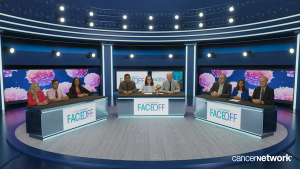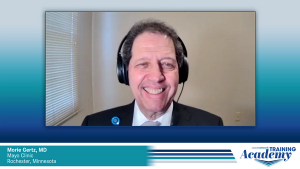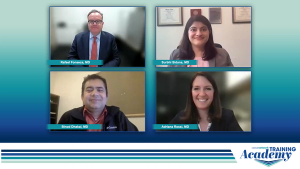Articles by Rafael Fonseca, MD
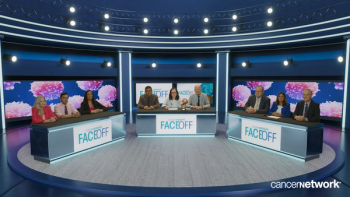
Use of CAR T-cell Therapy in Earlier Lines in Relapsed Refractory Multiple Myeloma
ByEhsan Malek, MD ,Peter Leif Bergsagel, MD,Rahul Banerjee, MD, FACP,Krina Patel, MD, MSc ,Tiffany Richards, PhD, ANP-BC, AOCNP ,Rafael Fonseca, MD,Sridevi Rajeeve, MD ,C. Ola Landgren, MD, PhD Panelists discuss how the use of CAR T-cell therapy in earlier lines of treatment for relapsed/refractory multiple myeloma could potentially improve long-term outcomes, considering factors such as patient selection, optimal timing, and the impact on subsequent treatment options.

Bispecific Selection in BCMA-failed Therapy for Relapsed Refractory Multiple Myeloma
ByEhsan Malek, MD ,Peter Leif Bergsagel, MD,Rahul Banerjee, MD, FACP,Krina Patel, MD, MSc ,Tiffany Richards, PhD, ANP-BC, AOCNP ,Rafael Fonseca, MD,Sridevi Rajeeve, MD ,C. Ola Landgren, MD, PhD Panelists discuss how to select appropriate bispecific antibody therapies for patients with relapsed/refractory multiple myeloma who have failed BCMA-targeted treatments, considering factors such as alternative targets, mechanisms of resistance, and emerging clinical data to provide effective subsequent treatment options.

Sequencing Therapies for Relapsed Refractory Multiple Myeloma: Bispecifics or CAR T-cell Therapy
ByEhsan Malek, MD ,Peter Leif Bergsagel, MD,Rahul Banerjee, MD, FACP,Krina Patel, MD, MSc ,Tiffany Richards, PhD, ANP-BC, AOCNP ,Rafael Fonseca, MD,Sridevi Rajeeve, MD ,C. Ola Landgren, MD, PhD Panelists discuss how to optimize the sequencing of bispecific antibodies and CAR T-cell therapies in relapsed/refractory multiple myeloma, considering factors such as patient characteristics, disease burden, and the unique advantages of each approach to maximize treatment efficacy and patient outcomes.
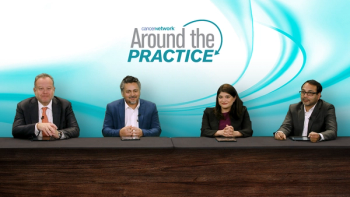
Panelists discuss effective strategies for promoting the adoption of bispecific antibodies in relapsed/refractory multiple myeloma (R/R MM) treatment, emphasizing the importance of educational initiatives, improving care transitions between academic and community settings, addressing misconceptions, and sharing key takeaways and clinical pearls for community oncologists.

Patient Case: A 67-Year-Old, BCMA-Naïve, Woman with Relapsed Refractory Multiple Myeloma
ByEhsan Malek, MD ,Peter Leif Bergsagel, MD,Rahul Banerjee, MD, FACP,Krina Patel, MD, MSc ,Tiffany Richards, PhD, ANP-BC, AOCNP ,Rafael Fonseca, MD,Sridevi Rajeeve, MD ,C. Ola Landgren, MD, PhD Panelists discuss how to tailor treatment strategies for a 67-year-old, BCMA-naïve woman with relapsed/refractory multiple myeloma, weighing the potential benefits of BCMA-targeted therapies against other available options in the context of her specific clinical presentation.

Patient Case: A 68-Year-Old Woman with Triple Class Exposed Relapsed Refractory Multiple Myeloma
ByEhsan Malek, MD ,Peter Leif Bergsagel, MD,Rahul Banerjee, MD, FACP,Krina Patel, MD, MSc ,Tiffany Richards, PhD, ANP-BC, AOCNP ,Rafael Fonseca, MD,Sridevi Rajeeve, MD ,C. Ola Landgren, MD, PhD Panelists discuss how to approach treatment decisions for a 68-year-old woman with triple-class exposed relapsed/refractory multiple myeloma, considering factors such as prior therapies, disease characteristics, and emerging treatment options to optimize her care.

Panelists discuss strategies for sequencing bispecific antibodies with B-cell maturation antigen (BCMA)–targeted therapies, considering factors such as prior CAR T-cell treatment, the impact of relapse timing on treatment decisions, and approaches for managing high-risk cytogenetics and extramedullary disease in relapsed/refractory multiple myeloma (R/R MM).

CARTITUDE-4: Cilta-cel vs Standard of Care Therapies in Relapsed Refractory Multiple Myeloma
ByEhsan Malek, MD ,Peter Leif Bergsagel, MD,Rahul Banerjee, MD, FACP,Krina Patel, MD, MSc ,Tiffany Richards, PhD, ANP-BC, AOCNP ,Rafael Fonseca, MD,Sridevi Rajeeve, MD ,C. Ola Landgren, MD, PhD Panelists discuss how the CARTITUDE-4 trial results show cilta-cel's superior efficacy over standard of care therapies in treating relapsed/refractory multiple myeloma, potentially reshaping treatment paradigms for this patient population.

KarMMa-3: Ide-cel vs Standard of Care Therapies in Relapsed Refractory Multiple Myeloma
ByEhsan Malek, MD ,Peter Leif Bergsagel, MD,Rahul Banerjee, MD, FACP,Krina Patel, MD, MSc ,Tiffany Richards, PhD, ANP-BC, AOCNP ,Rafael Fonseca, MD,Sridevi Rajeeve, MD ,C. Ola Landgren, MD, PhD Panelists discuss how the KarMMa-3 trial results demonstrate superior efficacy of ide-cel compared to standard of care therapies in patients with relapsed/refractory multiple myeloma, potentially establishing a new benchmark for treatment in this setting.

Panelists discuss the rationale behind combination strategies with bispecifics in relapsed/refractory multiple myeloma (R/R MM), highlighting key studies such as RedirecTT-1 for teclistamab and talquetamab, TRIMM-2 for talquetamab and daratumumab, and MagnetisMM-32 for elranatamab, along with considerations for step-up dosing and outpatient administration protocols.

Ide-Cel: Real-World Outcomes for Relapsed Refractory Multiple Myeloma
ByEhsan Malek, MD ,Peter Leif Bergsagel, MD,Rahul Banerjee, MD, FACP,Krina Patel, MD, MSc ,Tiffany Richards, PhD, ANP-BC, AOCNP ,Rafael Fonseca, MD,Sridevi Rajeeve, MD ,C. Ola Landgren, MD, PhD Panelists discuss how ide-cel, a CAR T-cell therapy, demonstrates promising real-world outcomes in patients with relapsed/refractory multiple myeloma, potentially offering a valuable treatment option for this challenging patient population.

Treatment Strategies in Relapsed Refractory Multiple Myeloma
ByEhsan Malek, MD ,Peter Leif Bergsagel, MD,Rahul Banerjee, MD, FACP,Krina Patel, MD, MSc ,Tiffany Richards, PhD, ANP-BC, AOCNP ,Rafael Fonseca, MD,Sridevi Rajeeve, MD ,C. Ola Landgren, MD, PhD Panelists discuss how novel therapeutic approaches and combination regimens are reshaping the landscape of treatment for patients with relapsed/refractory multiple myeloma, offering new hope for improved outcomes and quality of life.

Panelists discuss recent updates in the management of relapsed/refractory multiple myeloma, focusing on key studies such as MonumenTAL-2 for talquetamab, long-term follow-up data from the phase 1/2 MajesTEC-1 for teclistamab, and findings from MagnetisMM-3 regarding elranatamab.

Panelists discuss how the current treatment landscape for relapsed/refractory multiple myeloma (R/R MM) includes standard options like such as IMiDs, PIs, and mAbs, while highlighting the emergence of novel therapies such as CAR T- cells and bispecific antibodies, which address unmet needs and offer potential advantages in treatment efficacy and patient outcomes.
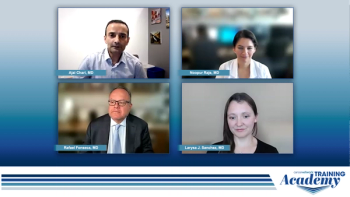
Noopur Raje, MD, discusses the role of T-cell affinity in bispecific therapy for patients with relapsed/refractory multiple myeloma and how it impacts treatment practices.

The panel discusses the benefits of having multiple BCMA-targeting bispecifics available for patients with relapsed/refractory multiple myeloma.

Rafael Fonseca, MD, discusses the role of bispecifics in relapsed/refractory multiple myeloma and the implications of incorporating them into combination regimens.

Noopur Raje, MD, reviews clinical research on elranatamab combination therapy in patients with relapsed/refractory multiple myeloma.

Focusing on clinical trials evaluating combination strategies with bispecifics, Larysa J. Sanchez, MD, discusses the TRIMM-2, TRIMM-3, and MajesTEC-3 studies.

Rafael Fonseca, MD, discusses the MonumenTAL-2 and MonumenTAL-3 clinical trials investigating talquetamab combination strategies in relapsed/refractory multiple myeloma.

Hematologist-oncologists discuss GPRC5D-targeting treatments that are currently in development for patients with relapsed/refractory multiple myeloma.

Noopur Raje, MD, shares clinical perspectives on her experience treating patients with prior BCMA bispecific exposure and provides insights on adverse event management practices in patients receiving talquetamab.

Larysa J. Sanchez, MD, discusses recent efficacy data presented at EHA 2024 from the long-term follow-up results of the phase 1/2 MonumenTAL-1 study investigating talquetamab in relapsed/refractory multiple myeloma.

A panel of experts on multiple myeloma discuss the importance of GPRC5D as a target of interest in relapsed/refractory disease and discuss their experiences with talquetamab in clinical practice.
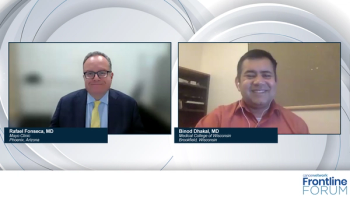
Experts provide concluding insights on CAR-T cell therapy and offer their perspectives on the evolving treatment landscape for multiple myeloma, highlighting potential future directions and innovations in patient care.

A panel of experts examines the impact and potential of CAR T-cell therapy in earlier treatment lines for multiple myeloma, evaluating its efficacy, safety.

Multiple myeloma experts analyze recent developments in transplant-ineligible newly diagnosed multiple myeloma treatment, focusing on the latest updates presented at EHA 2024 and their potential impact on patient care.

Key opinion leaders evaluate the clinical implications of updated data presented at EHA 2024, interpreting how these findings may influence future treatment strategies in multiple myeloma.

Multiple myeloma specialists analyze recent findings presented at EHA 2024, offering expert perspectives on the PERSEUS and IsKIA clinical trials and their implications for patient care.

Medical experts explore the current standard of care and evolving treatment landscape for transplant eligible multiple myeloma, a complex hematological malignancy.






